- Home
- Elizabeth Bear
An Apprentice to Elves Page 2
An Apprentice to Elves Read online
Page 2
“All right, then,” Alfgyfa muttered and stood up, leaning on the wall until she was sure she had reconciled what her eyes were telling her with the truth beneath her feet. She was not helped by the way the walls of the tunnel pulsed in and out, unpleasantly like the segments of a worm. But she caught the trick of it at last and was able to turn toward the dog-wolf’s unhappy, circling thoughts.
She found herself entering tunnels such as she had never seen before. The stone seemed melted in places, puddled—as if it had flowed of its own accord rather than being worked. Alfgyfa thought of hot wax, but mere wax would not have made her so nauseously uneasy.
She walked and walked, until she began to wonder if there was enough oil in the lamp to light her way home. She paused to consider, but in the moment when the echoes of her footfalls died away, she heard, faint but very sharp, the skrit of a wolf’s claws on stone. She knew that sound perfectly, and it decided her. It was closer to go ahead than to go back, and if her lantern did die while she was in these unsettling tunnels, she would at least have a wolf for company.
Not that the wolf seemed to want company. He was sore and bruised, limping with an injured joint and a painful spine. Underneath his great thirst—his throat rasped and his head pounded with it—his hunger also nagged at him, lesser but still twisting in his stomach. She felt the moment when he smelled her flesh, and the thought—meat—that accompanied the scent.
Not meat, she told him, and felt his ridicule of such a patent misstatement. Like-pack.
Which was even more ridiculous. How could she be like-pack, when she wasn’t even a wolf?
Edging cautiously through the lantern-faded dark—if Mastersmith and Mother Tin had impressed nothing else upon her, it was the dangers of old corridors, with their blind ways, deadfalls, and collapses—Alfgyfa found the edge of the pit into which the dog-wolf had fallen.
And more.
She heard him scritching below, uncertain now—because what kind of meat argued that it wasn’t meat?—and she could feel his konigenwolf more strongly. She was counseling her male to wait, and Alfgyfa felt the cold touch of her searching mind, quick and hesitant as a straining, twitching, cold nose brushed on tender bare human skin.
The konigenwolf was willing to wait while Alfgyfa assessed the situation, though Alfgyfa could feel her close and knew that if green-wood-burning thought her cub was threatened, she would act. A chill rolled up Alfgyfa’s spine, something she had never known from the attention of a wolf before. They had always been tender, tricky playmates—though protective and bossy, to be sure. But now she understood that green-wood-burning did not know her; did not trust her; and did not fear her at all.
For the first time in her life, Alfgyfa was scared of a wolf, just a little.
She peered over the edge of the pit. The lantern did not cast good light down, and there was no tilting it without spilling precious oil all over the trapped wolf. She couldn’t even make out what color his coat was—but she could see mice-under-snow moving down there, the restless, weary pacing he could not stop, no matter how sore and hungry and thirsty he was.
An icy draft cut down through the corridor. Raising her head, squinting beyond the ring of light from the lantern, Alfgyfa could see a tunnel rising at a slant above her. Beyond its mouth, the silhouette of dark branches tossed against a still-dark but faintly paler sky. Stars dusted it like frost starring a window, and seemed as cold.
A trellpit. A trap left over from the war between the svartalfar and the trolls, which the svartalfar had not closed up because this tunnel was of small use to them, being open to the sky. Alfgyfa eyed it. She might, she thought, manage to climb it if she left the lantern behind. She was not a wolf; she could brace her hands and feet against the opposite walls like nimble roots and push herself up the slanting chimney. But would that help her get the wolf out of the pit? Was there anything up there she could use to haul him out?
The chimney seemed very smooth-sided, and was probably slick with ice from snowmelt. If she fell, she’d just wind up in the pit with the wolf and no way out. And possibly a broken leg or hip to go with it. And then he would eat her, and she wouldn’t blame him at all.
Well. Maybe a little.
Alfgyfa had been lectured about her recklessness often enough to know that by svartalf standards she was very reckless indeed, but this seemed risky, even to her.
Still. There was a way to get him water, at least.
Green-wood-burning, she thought, trying to capture the tang and inflection of the smell in the konigenwolf’s thoughts. She pictured a great shaggy head pushing snow into the tunnel, and with care she showed the front paws not proceeding past the lip. She pictured it as a question, not a command. She knew better than to try to tell a konigenwolf what to do.
She got a dual response: a yearning for water from mice-under-snow beneath her and a half-amused, half-concerned agreement from green-wood-burning above. For a moment, she could feel another wolf, as green-wood-burning told him what to do—and it was a little comforting to see that wild konigenwolves were just as bossy as Viradechtis—and then the light was blocked out by a great shaggy head, almost exactly as she’d imagined it, and there was a slide of snow and pebbles and one or two twigs as the second wolf pushed the nearest snowdrift into the chimney. Once, one paw slid over, but with a whine and a scrabble, he regained solid ground before Alfgyfa even had time to be scared. Below her, mice-under-snow whined eagerly at the prospect of water; she heard him yelp as a pebble bounced off his nose, which made her think of her pebble rolling down the passageway into the darkness. The thought of that almost imperceptible slope, against the slope too steep to climb that had trapped mice-under-snow, and another, slightly larger twig sliding past her, and Alfgyfa felt suddenly as if Tin had cuffed her across the back of the head: she knew how to get mice-under-snow out of the pit.
Green-wood-burning saw it in her thoughts; the konigenwolf’s question was as plain as the tally marks Skjaldwulf drew on hides to reckon Franangford’s threatstrength.
It wasn’t something she knew how to explain—she couldn’t have expressed it properly in words, much less in the scent-and-pictures trellwolves used to communicate with humans—but she said, Let mice-under-snow get a drink, and then we will get him out.
And she felt green-wood-burning’s half-amused agreement again. If the little two-legs had an idea, the trellwolves would be glad to humor her. It would be better than waiting for mice-under-snow to die.
* * *
Alfgyfa’s plan did not work as well or as quickly as she would have liked; she was uneasily aware, as the light grew brighter in the sky above her, that it would not be very long now before someone noticed she was missing. Mice-under-snow was not entirely appreciative of the plan, either, as larger rocks and sticks and chunks of ice slid down to join him in his prison. He complained fretfully about being buried, and although, after a while, Alfgyfa thought that green-wood-burning began to see the point of what Alfgyfa was asking them to do, mice-under-snow certainly did not. But he scrambled higher and higher even as he complained, and finally, the moment came when he was able to make the scrabbling, straining jump from the mound of detritus in the pit, to the steep but not impassable slant of the stone chimney.
Without meaning to, Alfgyfa backed away from him. He was bigger than she’d thought, and he’d never really come round to thinking of her as anything other than dinner. But he didn’t even spare her a glance before he was heaving himself up to the—unmistakably daylight—world above.
And at that exact moment, a voice thundered from the opposite direction, “Alfgyfa Isolfrsdaughter, what in the nine secret names of Hel do you think you’re doing?”
* * *
The human child was pale, and glimmered like the veils of the night goddess against the cavern’s darkness.
“I was saving a wolf,” she said.
“A wolf,” Tin heard herself echo.
“He fell into the hole.” Alfgyfa—the name made Tin wince a little e
ach time she thought it—gestured up at the graying break in the cavern roof above. “I guess he slipped in the snow.”
Tin could tell that she was trying not to sound petulant or defensive. She was failing utterly.
“And how did you come to be out here in the cold, in your nightclothes, ’prentice, without permission?”
Alfgyfa studied the toes of her shoes. “I heard him.” Then she looked up, defiant, through bed-tangled hair. “He would have died if I hadn’t come to help him, Mastersmith! He would have starved down there!”
Tin stumped forward, leaning on her staff. Behind her, her other apprentices shifted and rustled. She took in the heaped and trampled snow, the branches. The paw prints. “You thought of this?”
Alfgyfa nodded.
“Why didn’t you come and wake me when you heard the wolf calling?” Tin asked. She worked to keep her voice reasonable. What on earth would she tell Isolfr if his willful cub got herself killed under Tin’s care? Isolfr wouldn’t start a war over it. But Isolfr wasn’t the whole of the werthreat, either.
“He didn’t call,” Alfgyfa said. “I heard him. And I had to do something.”
“And if you woke me, I might say you should not help?”
Alfgyfa nodded.
“Or I might tell you that you had to stay home, while I helped?”
No nod this time, so Tin knew she was closer to the truth. In nothing but her thin sleep clothes, Alfgyfa was shivering. The alfling inside Tin’s womb kicked like a swimmer. It would be a strong smith. As if accidentally, she draped the long warmth of her cloak over Alfgyfa as she gripped her shoulder.
“It was dangerous,” she said, turning Alfgyfa away from the pit, “to come out here into the trellwarren alone, without telling anyone where you were going. It was hasty. You risked your life, your father’s happiness—”
“I did not!”
“You did. And the alliance between your people and mine. Just so you could do something yourself that I could have handled more safely. Do you think you did well?”
Walking under the folds of Tin’s cloak, Alfgyfa kicked the floor. Then winced and stumbled from a stubbed toe. “Maybe not,” she said.
Tin knew she was lying.
ONE
Even as a grown woman of fifteen, Alfgyfa never stopped thinking about the wolves she had encountered as a child. Sometimes she tried to speak to them, stretching out into the pack-sense as far as she could.
Once she thought she caught a whisper of mice-under-snow; sometimes she was sure she caught the trailing edge of the wild konigenwolf’s thoughts. But if they heard her, they never answered.
And even as a grown woman of fifteen, Alfgyfa did not give over her visits to the trellwarrens. At first, Tin’s warnings and the almost-fate of the dog wolf had cowed her for a while. But Alfgyfa was not much-cowable by nature. And once discovered, the lure of those tunnels and their slick, shaped, twisted stone like the boles of ancient trees was beyond her power to resist.
She’d seen stone worked like this before, though it hadn’t had this twisting sense of otherness, of being a little dislocated in space between what her eyes told her and what her hands—or feet—felt. The aettrynalfar did something similar, in their caverns near Franangford, and Alfgyfa, who had treated Aettrynheim as every bit as much her home as the wolfheall, had frequently been permitted to watch the stonesmiths at work.
It had fascinated her then and it fascinated her now. She had watched the master stonesmith teaching her journeymen how to coax the stone to malleability, how to mold it as if it were soft clay, how to tease it into doing things clay could not. She had watched them spin a bridge one summer, delicate lacework that could support the weight of an entire troupe of cave bears.
Trellwork was different. The stone was twisted, gouged; she could see that it was worked with just as much care as the aettrynalfar stonesmiths used, and she came to recognize, if not to appreciate, the trellish aesthetics in the almost level floors, in the passageways that curved so subtly they looked straight, in the way that no corner was ever true.
She learned the corridors, the oddly shaped and angled rooms, and she tried to work backward from what was around her to what the working must have been like. The aettrynalfar had been disowned and exiled by their kin for shaping stone, and it was trellwork those long-ago svartalfar had feared.
Alfgyfa wanted to know why.
And not the reasons that the svartalfar gave her—and each other—about abomination and monstrosity and unthinkable perversion. That wasn’t how svartalfar curiosity worked.
It would make more sense, she thought, if the aettrynalfar had been exiled for their renunciation of weapons and war. Although that was another of their crimes, it wasn’t why the svartalfar had driven them out. They’d driven them out for smithing stone.
But Aettrynheim was nothing like the trellwarrens. There was nothing skew, nothing that deceived or betrayed. Nothing to make a person misjudge a doorway and bang into the wall, or fall flat, tricked by a new, undetectable angle in the slant of the floor. Alfgyfa always had excuses for bruises, being the only human—clumsy, awkward, too tall and yet with her arms stupidly short—among the svartalfar, but Master Tin and the other smiths would have been surprised to learn just how few of Alfgyfa’s bruises were gained in Nidavellir.
Sometimes she swore she could feel the trellwarrens twisting around her.
They frustrated her as much as they fascinated her, for there was only so much she could learn from observation alone, and there was no one she could ask questions of. Even if she’d been fool enough to try, no one knew the answers.
One of Alfgyfa’s earliest memories was tracing the trellscars on her father’s face. She did not want the trellwarrens inhabited again.
She just wanted to know.
* * *
If there was one thing Fargrimr Fastarrson hated more than another, it was waiting. Unfortunately for Fargrimr, lord-in-exile of Siglufjordhur, the Rhean invaders excelled at it, and so Fargrimr had spent all too much time since the fall of Siglufjordhur fourteen—nearly fifteen—years ago skulking through copses and behind bushes that by right of blood and birth were his.
His weeks were divided. Half his time belonged to those patient, infuriating Rheans: on the one hand, watching, and on the other hand, politicking to ensure that the men of the Northlands would not forget the Rheans, as time wore on, nor forget that their foothold at Siglufjordhur was just that—a foothold. The first step onto a foreign beach. Their waiting and garrisoning, Fargrimr was certain, was only a prelude to wider war.
He wished he knew why they waited.
His imagination supplied horrors aplenty: legions of soldiers; war engines; fell magics from beyond the sea. Strange weapons from places Fargrimr had never imagined, let alone visited. Ogres or giants in the Rheans’ horse-maned helmets.
It was a great comfort to him that the konungur, Gunnarr Sturluson, and Erik, godheofodman of Hergilsberg, took the danger seriously. It was a comfort, too, that they had sent south a complement of trellwolves and wolfcarls to form the threat of a new wolfheall (named to honor Freya), under the young konigenwolf, gray Signy—Viradechtisdaughter Vigdisdaughter—and her wolfsprechend, Hreithulfr.
The keep Fargrimr had raised in exile shared walls with the wolfheall, as no jarl’s keep had done before. Together, they commanded a riverine pass between two wooded fells, and protected a narrow but rich valley below, where his hastily relocated farmers managed to scratch fields and plant crops.
The other half of his time was thus devoted to the far more satisfying duties of a jarl with folk to house and cattle to feed: though the fortress and town at Siglufjordhur had fallen, and the farmlands and crofts sustaining it, the wildlands beyond were but patrolled by the Rheans—nervously, and in force. Fargrimr and his surviving thanes and carls knew those wildlands like the smell of their wives’ hair.
The first winter, they lost half a dozen people and a third of the livestock. Mostly the youngest and the eldes
t, always the most susceptible, but still more than a well-run keep should lose—more than Siglufjordhur-in-exile could afford to. The second winter, though they were all still scarred by grief, only two old men died, and a wolf in his thirty-first molting. They slaughtered meat and smoked it, and with the exception of a ewe lost to a gods-knew-what ailment peculiar to sheep, every other animal spared the autumn culling survived to spring.
In addition to Signy, the Freyasthreat also boasted another she-wolf, tawny Ingrun, wolf-sister to Fargrimr’s brother Randulfr. Ingrun was no konigenwolf, just a bitch of the ranks, and smaller than some of the big males—but she was still a wolf-bitch, still strength for a new pack. And though Fargrimr would never admit it, it comforted him to have his brother near.
Fargrimr hated waiting, but he was good at husbandry. Well, the one sort of husbandry. For the other—being a sworn-son, he’d need help getting an heir. Which was another reason it pleased him to have Randulfr nearby, for Randulfr was equipped for heir-getting in ways Fargrimr was not.
The new heall and keep were a half day’s travel from the old. Fargrimr imagined the damned Rheans, safe inside his stone walls, and it made him itch and fuss and nag Randulfr about getting a few heirs. Randulfr—being a wolfcarl—couldn’t marry, but he could certainly beget, and Fargrimr lost no opportunity to suggest that he would be more than happy to adopt and foster his brother’s children as his own. Randulfr made excuses about not having found the right woman yet; Fargrimr offered to introduce him to a few. Randulfr made excuses about it being a bad time to bring children into the world; Fargrimr offered to eat his dagger in small bites if there had ever been a good one.
The bickering was an echo of childhood that comforted and amused them both. Fargrimr knew that Randulfr hated—as he had always hated—to do what tradition and custom expected of him, and that was a good half of how he’d ended up a wolfcarl and not a tattooed seacoast lord. But he had no more intention than Fargrimr did of leaving Siglufjordhur without an heir. He just needed to make his independence clear. Fargrimr might be Jarl of Siglufjordhur, but he was still Randulfr’s younger brother, and Randulfr would not dance to his piping.

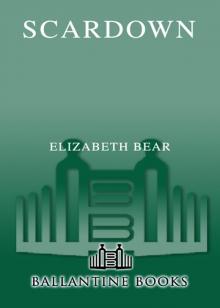 Scardown
Scardown Worldwired
Worldwired Ancestral Night
Ancestral Night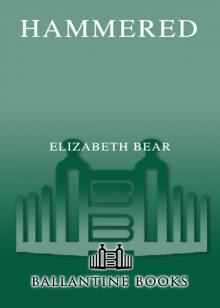 Hammered
Hammered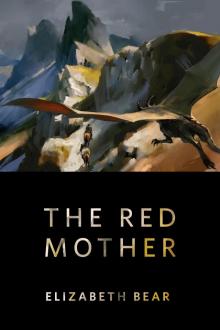 The Red Mother
The Red Mother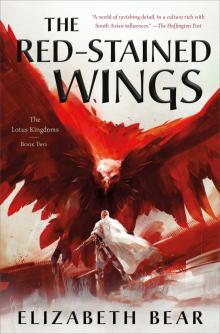 The Red-Stained Wings--The Lotus Kingdoms, Book Two
The Red-Stained Wings--The Lotus Kingdoms, Book Two Machine
Machine Some of the Best from Tor.com: 2019 Edition
Some of the Best from Tor.com: 2019 Edition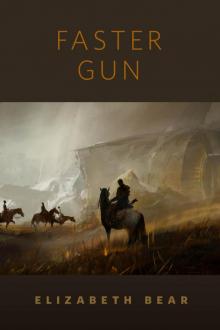 Faster Gun
Faster Gun In the House of Aryaman, a Lonely Signal Burns
In the House of Aryaman, a Lonely Signal Burns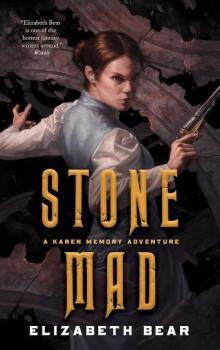 Stone Mad
Stone Mad Robots: The Recent A.I.
Robots: The Recent A.I.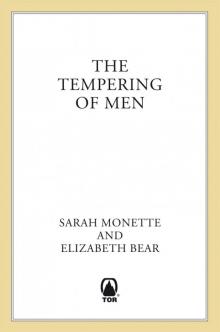 The Tempering of Men
The Tempering of Men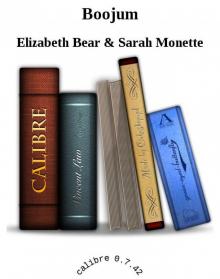 Boojum
Boojum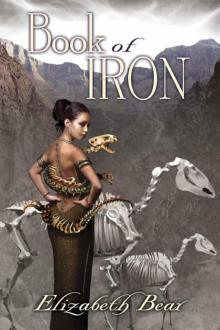 Book of Iron bajc-2
Book of Iron bajc-2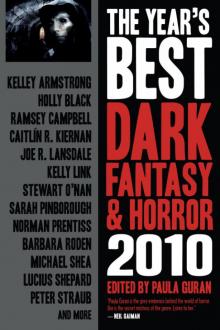 The Year's Best Dark Fantasy and Horror, 2010
The Year's Best Dark Fantasy and Horror, 2010 New Cthulhu 2: More Recent Weird
New Cthulhu 2: More Recent Weird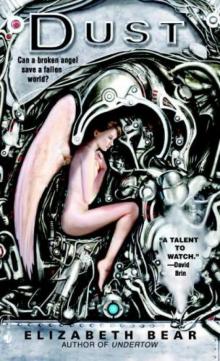 Dust jl-1
Dust jl-1 Worldwired jc-3
Worldwired jc-3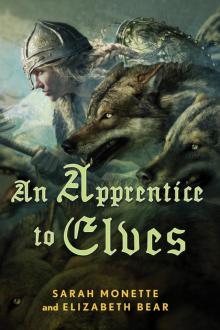 An Apprentice to Elves
An Apprentice to Elves Hammered jc-1
Hammered jc-1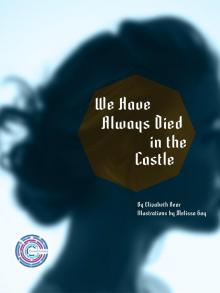 Crowd Futures: We Have Always Died in the Castle
Crowd Futures: We Have Always Died in the Castle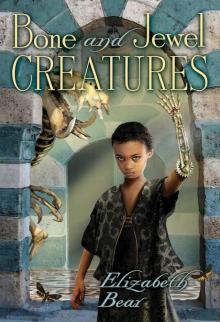 Bone and Jewel Creatures bajc-1
Bone and Jewel Creatures bajc-1 Carnival
Carnival Some of the Best from Tor.com: 2012 Edition: A Tor.Com Original
Some of the Best from Tor.com: 2012 Edition: A Tor.Com Original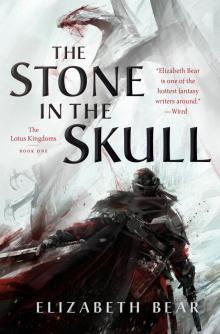 The Stone in the Skull
The Stone in the Skull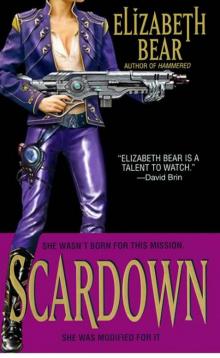 Scardown jc-2
Scardown jc-2 Hell and Earth pa-4
Hell and Earth pa-4 Undertow
Undertow Mermaids and Other Mysteries of the Deep
Mermaids and Other Mysteries of the Deep A Companion to Wolves
A Companion to Wolves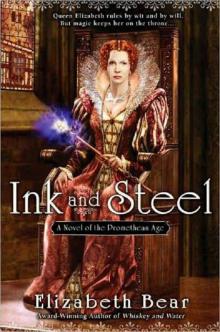 Ink and Steel pa-3
Ink and Steel pa-3